Unit 6 Food and lifestyle复习课件(14张PPT)
文档属性
| 名称 | Unit 6 Food and lifestyle复习课件(14张PPT) |

|
|
| 格式 | zip | ||
| 文件大小 | 197.5KB | ||
| 资源类型 | 教案 | ||
| 版本资源 | 牛津译林版 | ||
| 科目 | 英语 | ||
| 更新时间 | 2018-11-05 00:00:00 | ||
图片预览

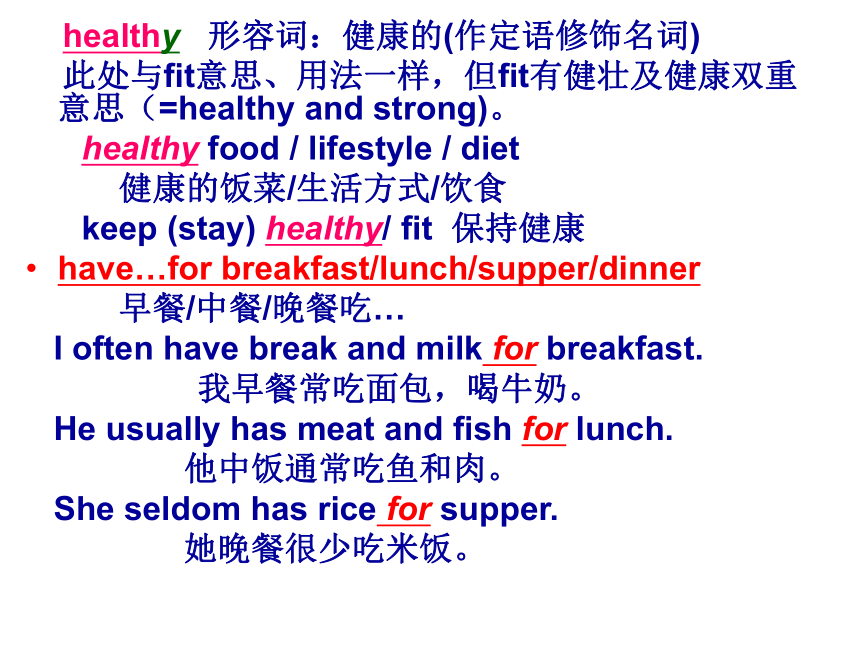
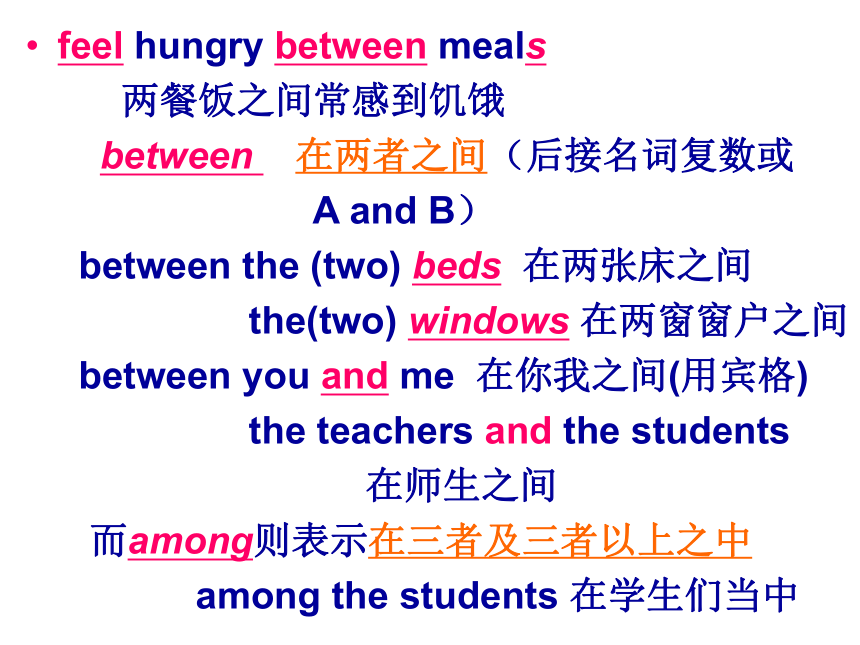
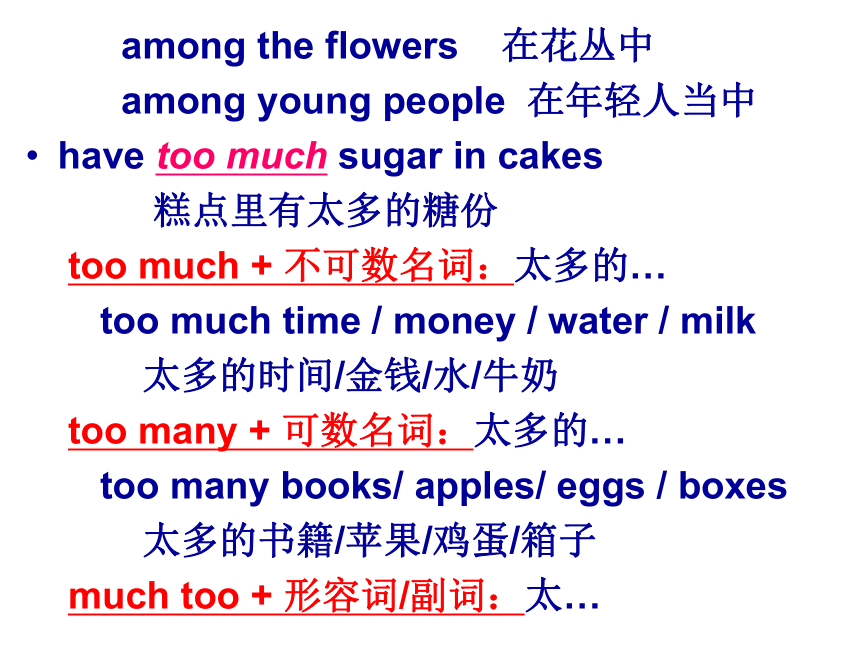
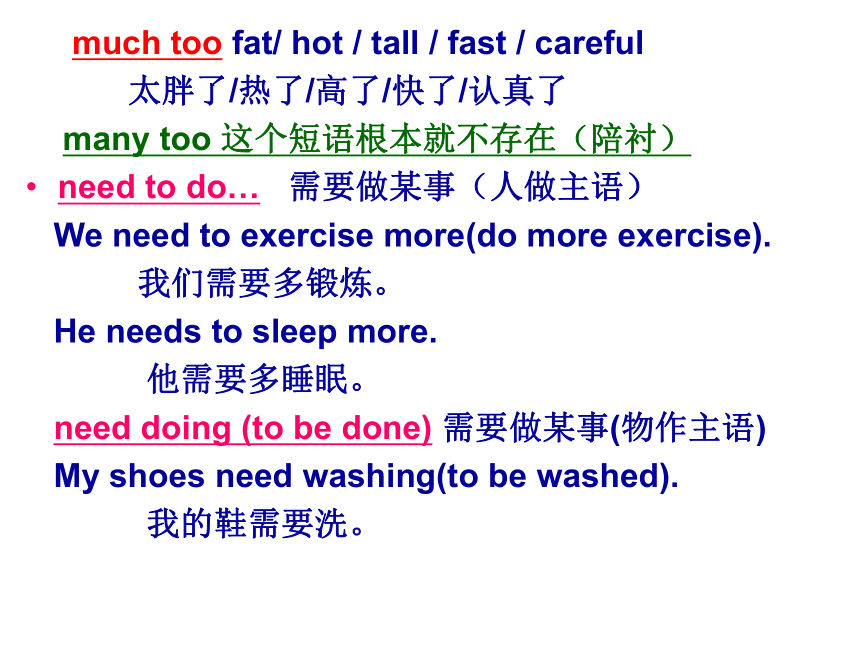
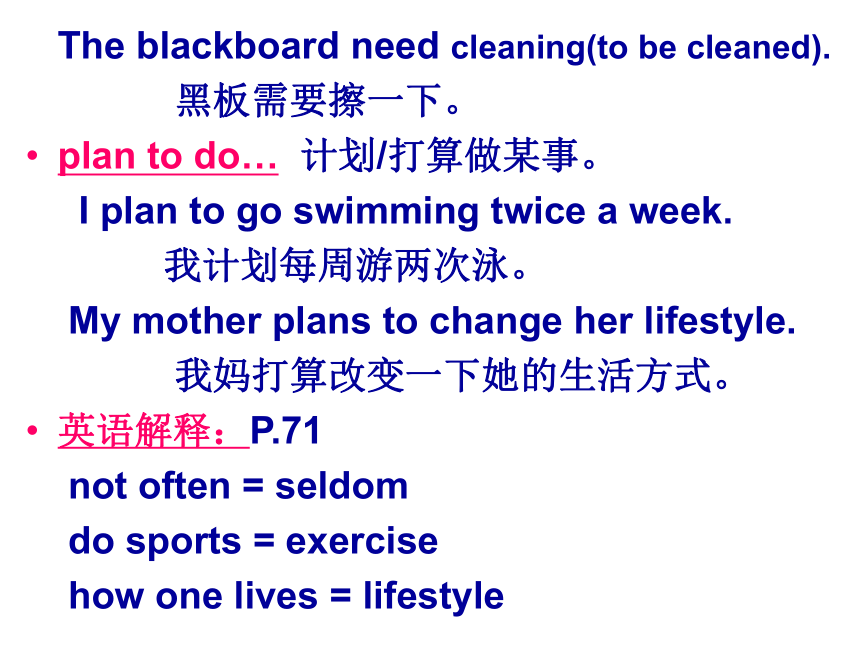
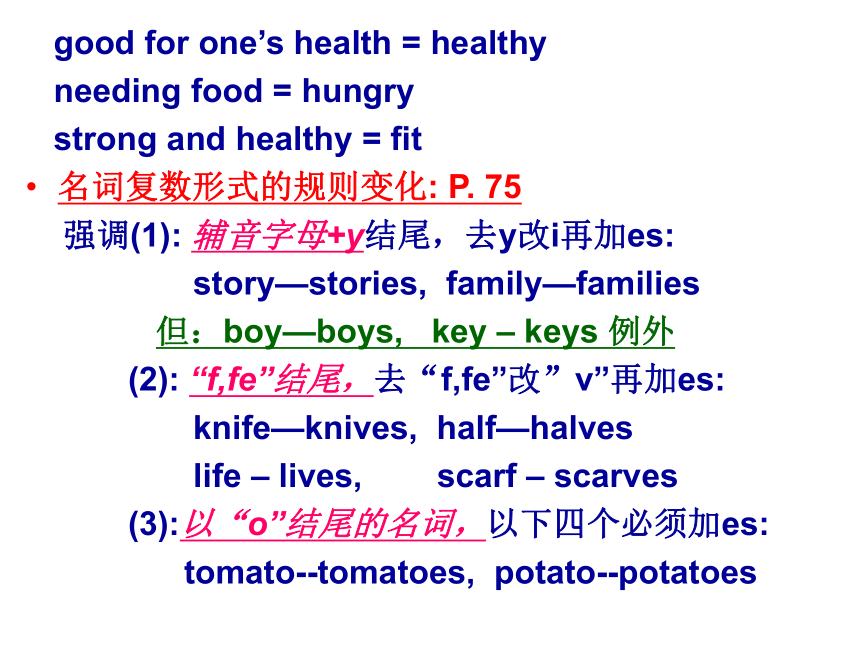
文档简介
Unit Six
知识点汇集
be good / bad for… 对…有好处/坏处。
Vegetables and fruits are good for our health.
蔬菜与水果对我们的健康有益。
Smoking is bad for us students.
吸烟对我们学生有害。
health 名词:健康
our health, their health, your health
我们的健康/他们的健康/你的健康
in good health, in bad health 身体好/差
healthy 形容词:健康的(作定语修饰名词)
此处与fit意思、用法一样,但fit有健壮及健康双重意思(=healthy and strong)。
healthy food / lifestyle / diet
健康的饭菜/生活方式/饮食
keep (stay) healthy/ fit 保持健康
have…for breakfast/lunch/supper/dinner
早餐/中餐/晚餐吃…
I often have break and milk for breakfast.
我早餐常吃面包,喝牛奶。
He usually has meat and fish for lunch.
他中饭通常吃鱼和肉。
She seldom has rice for supper.
她晚餐很少吃米饭。
feel hungry between meals
两餐饭之间常感到饥饿
between 在两者之间(后接名词复数或
A and B)
between the (two) beds 在两张床之间
the(two) windows 在两窗窗户之间
between you and me 在你我之间(用宾格)
the teachers and the students
在师生之间
而among则表示在三者及三者以上之中
among the students 在学生们当中
among the flowers 在花丛中
among young people 在年轻人当中
have too much sugar in cakes
糕点里有太多的糖份
too much + 不可数名词:太多的…
too much time / money / water / milk
太多的时间/金钱/水/牛奶
too many + 可数名词:太多的…
too many books/ apples/ eggs / boxes
太多的书籍/苹果/鸡蛋/箱子
much too + 形容词/副词:太…
much too fat/ hot / tall / fast / careful
太胖了/热了/高了/快了/认真了
many too 这个短语根本就不存在(陪衬)
need to do… 需要做某事(人做主语)
We need to exercise more(do more exercise).
我们需要多锻炼。
He needs to sleep more.
他需要多睡眠。
need doing (to be done) 需要做某事(物作主语)
My shoes need washing(to be washed).
我的鞋需要洗。
The blackboard need cleaning(to be cleaned).
黑板需要擦一下。
plan to do… 计划/打算做某事。
I plan to go swimming twice a week.
我计划每周游两次泳。
My mother plans to change her lifestyle.
我妈打算改变一下她的生活方式。
英语解释:P.71
not often = seldom
do sports = exercise
how one lives = lifestyle
good for one’s health = healthy
needing food = hungry
strong and healthy = fit
名词复数形式的规则变化: P. 75
强调(1): 辅音字母+y结尾,去y改i再加es:
story—stories, family—families
但:boy—boys, key – keys 例外
(2): “f,fe”结尾,去“f,fe”改”v”再加es:
knife—knives, half—halves
life – lives, scarf – scarves
(3):以“o”结尾的名词,以下四个必须加es:
tomato--tomatoes, potato--potatoes
mango – mangoes, hero – heroes
其余以“o”结尾的名词,只需加“s”。
名词复数形式的不规则变化:P.75
必须强化记忆:
(1)凡man 结尾的名词基本上都改为
--- men:woman—women
policeman—policemen
postman – postmen
(2)凡名词当中为oo的名词基本上都改为
--- ee: foot – feet , tooth -- teeth
(3)单复数不变化的:
sheep -- sheep , fish – fish, deer -- deer
Chinese -- Chinese, Japanese – Japanese
(4)名词复数变化根本没有规律的:
child – children, mouse – mice
不可数名词如想计量,则需加计量单位,即量词(由名词+of构成):
two boxes of books, three boxes of milk
a bag of rice, two cartons of juice
four kilos of meat, five plates of fish
a glass of water, three cups of tea
five bottles of coke, two cans/tins of Sprite
three pieces of bread, two pairs of trainers
There’s a bottle of coke on the table.
How many bottles of coke are there on the table?
There’s a kilo of meat in the fridge.
How much meat is there in the fridge?
There are some apples in the bag.
How many apples are there in the bag?
There are two books under the desk.
What’s (there) under the desk?
There is a lot of milk in the bottle.
What’s (there) in the bollle?
less than (不到,少于)
less 是little的比较级 ,常与数词搭配使用:
He is less than 20 years old.
There are less than 60 students in our class.
It’s less than five o’clock.
less than的反义词组为: more than (over)
多于,超过,more是many 或much的比较级:
它与常与数词搭配使用:
My mother is over (more than) 80 years old.
There are over(more than) 3000 students in our
school.
It’s over (more than) 10 o’clock now.
taste(尝起来), sound (听起来), smell (闻起来),
look (看起来), feel (摸起来)
以上五个单词为常用的联系动词,一定要记住:
联系动词后面只能接形容词,绝不能接副词:
taste good 不能用:taste well
sound nice sound badly
smell sweet smell nicely
look cool (well) look happily
feel comfortball feel softly
但如look 与 at 搭配时,就由联系动词转换为行为动词,那后面就必须用副词来修饰:
look happily / sadly / angrily / excitedly at sb
开心地/难过地/生气地/激动地看着某人
但下面一句中应填什么样的词汇呢?
The children look very ______ ( happy) at
the good news.
在这儿是填happily 还是 happy呢?为什么?
give sb enough energy for sth/ doing sth
给某人某事/做某事提供足够的能量
The meal can give me enough for the whole morning.
这两顿饭给我整上午提供足够的能量。
Meat and fish give them enough energy for playing football in the afternoon.
鱼和肉给他们下午踢足球提供了足够的能量。
知识点汇集
be good / bad for… 对…有好处/坏处。
Vegetables and fruits are good for our health.
蔬菜与水果对我们的健康有益。
Smoking is bad for us students.
吸烟对我们学生有害。
health 名词:健康
our health, their health, your health
我们的健康/他们的健康/你的健康
in good health, in bad health 身体好/差
healthy 形容词:健康的(作定语修饰名词)
此处与fit意思、用法一样,但fit有健壮及健康双重意思(=healthy and strong)。
healthy food / lifestyle / diet
健康的饭菜/生活方式/饮食
keep (stay) healthy/ fit 保持健康
have…for breakfast/lunch/supper/dinner
早餐/中餐/晚餐吃…
I often have break and milk for breakfast.
我早餐常吃面包,喝牛奶。
He usually has meat and fish for lunch.
他中饭通常吃鱼和肉。
She seldom has rice for supper.
她晚餐很少吃米饭。
feel hungry between meals
两餐饭之间常感到饥饿
between 在两者之间(后接名词复数或
A and B)
between the (two) beds 在两张床之间
the(two) windows 在两窗窗户之间
between you and me 在你我之间(用宾格)
the teachers and the students
在师生之间
而among则表示在三者及三者以上之中
among the students 在学生们当中
among the flowers 在花丛中
among young people 在年轻人当中
have too much sugar in cakes
糕点里有太多的糖份
too much + 不可数名词:太多的…
too much time / money / water / milk
太多的时间/金钱/水/牛奶
too many + 可数名词:太多的…
too many books/ apples/ eggs / boxes
太多的书籍/苹果/鸡蛋/箱子
much too + 形容词/副词:太…
much too fat/ hot / tall / fast / careful
太胖了/热了/高了/快了/认真了
many too 这个短语根本就不存在(陪衬)
need to do… 需要做某事(人做主语)
We need to exercise more(do more exercise).
我们需要多锻炼。
He needs to sleep more.
他需要多睡眠。
need doing (to be done) 需要做某事(物作主语)
My shoes need washing(to be washed).
我的鞋需要洗。
The blackboard need cleaning(to be cleaned).
黑板需要擦一下。
plan to do… 计划/打算做某事。
I plan to go swimming twice a week.
我计划每周游两次泳。
My mother plans to change her lifestyle.
我妈打算改变一下她的生活方式。
英语解释:P.71
not often = seldom
do sports = exercise
how one lives = lifestyle
good for one’s health = healthy
needing food = hungry
strong and healthy = fit
名词复数形式的规则变化: P. 75
强调(1): 辅音字母+y结尾,去y改i再加es:
story—stories, family—families
但:boy—boys, key – keys 例外
(2): “f,fe”结尾,去“f,fe”改”v”再加es:
knife—knives, half—halves
life – lives, scarf – scarves
(3):以“o”结尾的名词,以下四个必须加es:
tomato--tomatoes, potato--potatoes
mango – mangoes, hero – heroes
其余以“o”结尾的名词,只需加“s”。
名词复数形式的不规则变化:P.75
必须强化记忆:
(1)凡man 结尾的名词基本上都改为
--- men:woman—women
policeman—policemen
postman – postmen
(2)凡名词当中为oo的名词基本上都改为
--- ee: foot – feet , tooth -- teeth
(3)单复数不变化的:
sheep -- sheep , fish – fish, deer -- deer
Chinese -- Chinese, Japanese – Japanese
(4)名词复数变化根本没有规律的:
child – children, mouse – mice
不可数名词如想计量,则需加计量单位,即量词(由名词+of构成):
two boxes of books, three boxes of milk
a bag of rice, two cartons of juice
four kilos of meat, five plates of fish
a glass of water, three cups of tea
five bottles of coke, two cans/tins of Sprite
three pieces of bread, two pairs of trainers
There’s a bottle of coke on the table.
How many bottles of coke are there on the table?
There’s a kilo of meat in the fridge.
How much meat is there in the fridge?
There are some apples in the bag.
How many apples are there in the bag?
There are two books under the desk.
What’s (there) under the desk?
There is a lot of milk in the bottle.
What’s (there) in the bollle?
less than (不到,少于)
less 是little的比较级 ,常与数词搭配使用:
He is less than 20 years old.
There are less than 60 students in our class.
It’s less than five o’clock.
less than的反义词组为: more than (over)
多于,超过,more是many 或much的比较级:
它与常与数词搭配使用:
My mother is over (more than) 80 years old.
There are over(more than) 3000 students in our
school.
It’s over (more than) 10 o’clock now.
taste(尝起来), sound (听起来), smell (闻起来),
look (看起来), feel (摸起来)
以上五个单词为常用的联系动词,一定要记住:
联系动词后面只能接形容词,绝不能接副词:
taste good 不能用:taste well
sound nice sound badly
smell sweet smell nicely
look cool (well) look happily
feel comfortball feel softly
但如look 与 at 搭配时,就由联系动词转换为行为动词,那后面就必须用副词来修饰:
look happily / sadly / angrily / excitedly at sb
开心地/难过地/生气地/激动地看着某人
但下面一句中应填什么样的词汇呢?
The children look very ______ ( happy) at
the good news.
在这儿是填happily 还是 happy呢?为什么?
give sb enough energy for sth/ doing sth
给某人某事/做某事提供足够的能量
The meal can give me enough for the whole morning.
这两顿饭给我整上午提供足够的能量。
Meat and fish give them enough energy for playing football in the afternoon.
鱼和肉给他们下午踢足球提供了足够的能量。
同课章节目录
- 预备课程
- Lesson 1 Nice to meet you !
- Lesson 2 A happy family
- Lesson 3 A nice school
- Lesson 4 You look cool !
- Lesson 5 Wonderful things
- Lesson 6 Have nice food
- Lesson 7 Enjoy our days
- Lesson 8 Let's have fun !
- Unit 1 This is me
- Unit 2 Let's play sports
- Unit 3 Welcome to our school
- Unit 4 My day
- Unit 5 Let’s celebrate
- Unit 6 Food and lifestyle
- Unit 7 Shopping
- Unit 8 Fashion
